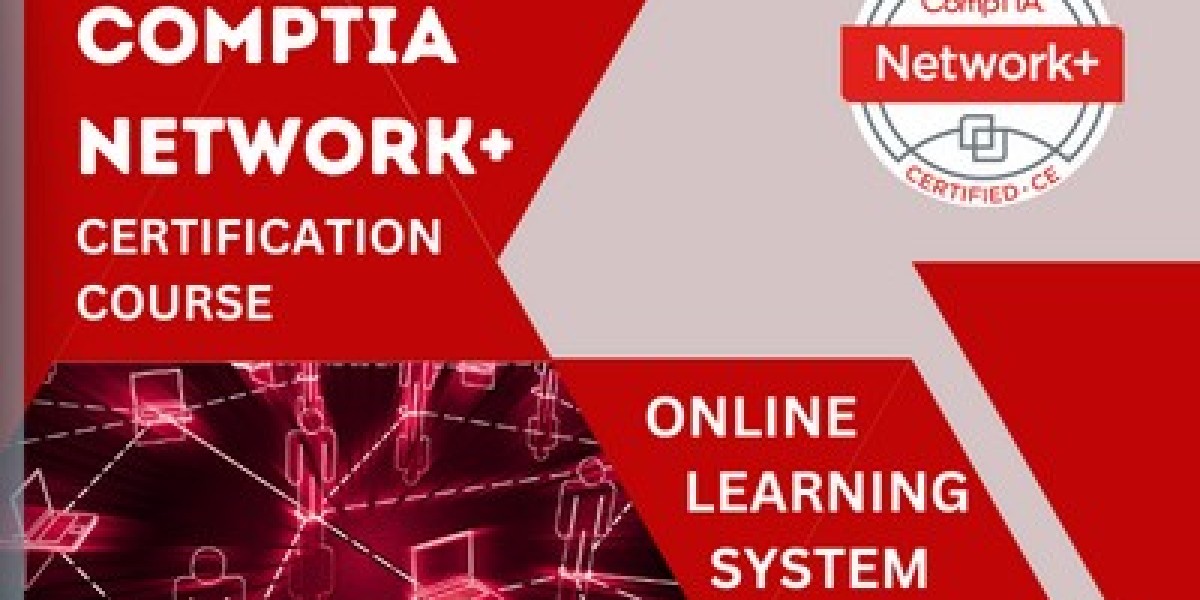In today's digital landscape, networking expertise is fundamental to managing and securing information systems in organizations of all sizes. The CompTIA Network+ certification is one of the most respected and recognized certifications for networking professionals, often seen as an entry-level yet essential credential for those beginning or advancing in IT network management. This article dives into what CompTIA Network+ certification entails, why it's valuable, how to prepare for it, and the potential career paths it opens.
Understanding CompTIA Network+ Certification
CompTIA Network+ Training in Houston is designed to validate the essential knowledge and skills required for networking professionals. It is part of CompTIA's vendor-neutral certification program, making it applicable across different platforms and technologies. Unlike certifications tied to specific vendors like Cisco or Microsoft, CompTIA Network+ focuses on general networking concepts and skills, ensuring a broad understanding applicable to a variety of environments.
The certification covers several critical domains, including:
- Networking Fundamentals – Understanding of basic networking concepts, including types of networks, protocols, and connectivity.
- Network Infrastructure – Knowledge of devices and hardware like routers, switches, and firewalls, and how they interact within a network.
- Network Operations – Skills in managing, configuring, and maintaining network infrastructure.
- Network Security – Basics of securing networks, understanding potential vulnerabilities, and implementing security protocols.
- Network Troubleshooting – Ability to diagnose and solve issues related to network connectivity, performance, and security.
The latest version of the exam, CompTIA Network+ (N10-008), ensures that certified individuals are up to date with modern networking trends and technologies, including virtual networking, cloud computing, and emerging security threats.
Why Pursue the CompTIA Network+ Certification?
There are several reasons why IT professionals should consider earning the CompTIA Network+ certification:
Entry-Level Gateway – CompTIA Network+ is often considered an entry-level networking certification, making it ideal for those new to IT networking. It lays the foundation of networking knowledge necessary for more advanced certifications.
Broad Applicability – As a vendor-neutral certification, Network+ is applicable in various environments, regardless of the specific hardware or software a company uses. This versatility makes it valuable to employers who rely on a mix of technology solutions.
Skills Validation – Network+ certifies a comprehensive set of skills that demonstrate a professional's ability to handle essential networking tasks, from configuring devices to troubleshooting and securing a network.
Industry Recognition – Network+ is widely recognized by employers across the IT industry. Holding this certification demonstrates to hiring managers and colleagues that you have a strong understanding of networking principles and practices.
Foundation for Further Certifications – Network+ serves as a solid foundation for other more specialized or advanced certifications, such as CompTIA Security+, Cisco's CCNA, or CompTIA Cybersecurity Analyst (CySA+).
Enhanced Career Opportunities – Network+ can open doors to roles such as Network Administrator, Network Support Specialist, and IT Technician, among others, in industries such as telecommunications, IT services, and finance.
Exam Structure and Requirements
The CompTIA Network+ exam (N10-008) consists of 90 questions in multiple-choice, performance-based, and drag-and-drop formats. Performance-based questions simulate real-world scenarios, allowing candidates to demonstrate their skills in practical settings. Test-takers are allotted 90 minutes to complete the exam, and a passing score of 720 out of 900 is required.
The CompTIA Network+ exam covers five main domains:
- Networking Fundamentals (24%) – Covers the types of networks, common protocols (such as TCP/IP, DNS, and DHCP), subnetting, IP addressing, and routing concepts.
- Network Implementations (19%) – Focuses on the devices and technologies involved in building and managing networks, including routers, switches, and wireless networks.
- Network Operations (16%) – Includes the management and monitoring of network infrastructure and network configurations.
- Network Security (19%) – Encompasses network security concepts, including security protocols, device security, and network hardening.
- Network Troubleshooting (22%) – Prepares candidates to diagnose and troubleshoot network issues, including connectivity problems, hardware malfunctions, and performance degradation.
The exam fee varies by location, but it typically costs around $338. CompTIA also offers exam vouchers and bundles that include study materials and retake options.
How to Prepare for the CompTIA Network+ Exam
Preparation is key to passing the CompTIA Network+ exam. Here are some effective steps and resources to consider:
Understand the Exam Objectives – Begin by reviewing the CompTIA Network+ (N10-008) exam objectives available on CompTIA’s official website. This document breaks down each domain and helps you focus on essential topics.
Use Study Guides – CompTIA offers official study guides, but there are also many reputable third-party guides available, such as CompTIA Network+ Study Guide by Todd Lammle or CompTIA Network+ All-in-One Exam Guide by Mike Meyers. These books cover the exam content in depth and often include practice questions.
Enroll in Online Courses – Many online platforms, like Udemy, Pluralsight, and LinkedIn Learning, offer CompTIA Network+ courses taught by industry experts. These courses can provide video lectures, quizzes, and hands-on labs to reinforce learning.
Participate in Hands-On Labs – Practical skills are essential for passing performance-based questions. Many online resources, including CompTIA Labs, provide virtual labs where you can practice configuring devices, troubleshooting, and network setup.
Take Practice Exams – Practice exams are invaluable for assessing your knowledge and familiarizing yourself with the test format. CompTIA, as well as various online providers, offer practice exams that can simulate the real testing experience.
Join Study Groups or Forums – Engaging with other test-takers in online forums or study groups can be a helpful way to clarify concepts, share resources, and stay motivated. Reddit, TechExams, and CompTIA’s official forums are good places to connect with others preparing for Network+.
Career Opportunities with CompTIA Network+
Achieving CompTIA Network+ certification can open the door to a range of roles within the IT industry. Some of the most common positions include:
- Network Support Specialist – Provides technical support to organizations and maintains the computer networks by diagnosing and troubleshooting problems.
- Network Administrator – Manages and maintains a company’s network, ensuring that all devices and connections are running smoothly and securely.
- IT Technician – Handles day-to-day IT needs within a business, including network setup, device installation, and troubleshooting.
- Help Desk Technician – Provides remote or on-site support for hardware and network issues, assisting users with connectivity issues, device setup, and basic troubleshooting.
- Systems Administrator – Manages the overall IT infrastructure of an organization, including network configuration and maintenance.
- Field Service Technician – Travels to different client sites to set up, maintain, and troubleshoot networks and IT systems.
Salary Expectations
The average salary for CompTIA Network+ certified professionals varies based on experience, location, and job role. Generally, entry-level positions like Network Support Specialist and Help Desk Technician have an average salary of $45,000 - $60,000 per year, while more experienced roles, such as Network Administrators and System Administrators, can range from $65,000 - $85,000 or more.
According to recent industry surveys, Network+ certification holders can expect an increase in salary as they gain experience and take on more complex roles, especially if they pursue additional certifications like CompTIA Security+ or Cisco's CCNA.
Continuing Your Networking Career
While CompTIA Network+ is an excellent starting point, professionals often pursue advanced certifications to further their careers. Some of the next steps after Network+ include:
- CompTIA Security+ – This certification focuses on cybersecurity fundamentals, which is critical as networks increasingly face security threats.
- Cisco Certified Network Associate (CCNA) – For those looking to specialize in Cisco technologies, the CCNA provides in-depth knowledge of Cisco networking and routing.
- CompTIA Cybersecurity Analyst (CySA+) – This certification focuses on identifying and defending against security threats, which is crucial for network security.
- Certified Information Systems Security Professional (CISSP) – CISSP is a more advanced certification that provides comprehensive cybersecurity expertise, often a goal for those in or aspiring toward network security roles.
Final Thoughts
The CompTIA Network+ certification is a valuable credential for anyone looking to start or strengthen their career in networking. It provides a foundational understanding of networking concepts, prepares candidates for real-world scenarios, and offers a flexible pathway to more specialized certifications and higher-level IT roles. For those committed to pursuing a career in IT, achieving Network+ certification can be the first step toward a successful and rewarding professional journey. Whether you're an IT newcomer or a seasoned professional looking to validate your skills, CompTIA Network+ certification can enhance your knowledge, boost your confidence, and unlock new career possibilities.







